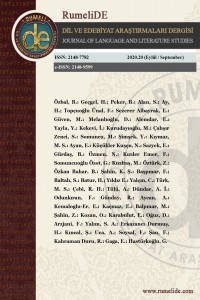Abstract
Recaîzade Mahmut Ekrem’in (1847-1914) eser verdiği türler arasında tiyatro da vardır. Onun dört piyesi bulunmaktadır. O tiyatroya, henüz edebî hayatının başlarında ilgi duyup bu türde eser verirken zamanla ondan uzaklaşır. Edebî verimini daha çok şiirleri ve teorik çalışmaları ile oluşturan yazarın, aslında, bu çalışmayla adını duyurduğumuz beşinci bir piyesi daha vardır. “Havada Çarpışan Sesler yahut Sahnesiz bir Temaşa” adlı bu küçürek piyes, 1910 Haziran’ında Donanma mecmuasında yayımlanmıştır. Piyes, Donanma Cemiyeti’nin düzenlediği yardım sürecinin kapsamında yayımlanmıştır. Recaîzade Ekrem, halkın bu sürece yeterince maddî katkıda bulunmadığı düşüncesi üzerine kaleme aldığı bu küçürek piyesinde özellikle İstanbul’da yaşayan varlıklı insanlara eleştirel bir tutum takınır; onları zevke, eğlenceye para harcamak yerine bu kampanyaya destek olmaya çağırır. Piyes, adından da anlaşılacağı üzere, sahne gerektirmeyen bir yapıya sahiptir. Figüratif kadrosu üç “ses”ten ibaret olan piyeste bir Osmanlı vatanseverinin yüreği, vatan ve toplumsal bilinç/vicdan “Birinci Ses”, “İkinci Ses” ve “Üçüncü Ses” olarak konuşurlar. Eser bu özelliğiyle alegorik, dolayısıyla metaforik bir nitelik taşır.
References
- Baldick, C. (2008). Dictionary of Literary Terms, 3. Ed., New York: Oxford University Press.
- Cuddon, J.A.. (1999). Dictionary of Literary Terms&Literary Theory, St. Ivesplc: Penguin Books.
- Devellioğlu, F. (1999). Osmanlıca-Türkçe Lûgat, 16.b., Ankara: Aydın Kitabevi.
- Donanma, S.1, Mart 1910.................................
- Huyugüzel, Ö.F. (2018). Eleştiri Terimleri Sözlüğü, İstanbul: Dergâh.
- Muallim Naci (1978). Lûgat-i Naci, İstanbul: Çağrı.
- Özçelik, S. (2000). Donanma-yı Osmanî Muavenet-i Milliye Cemiyeti, Ankara: Türk Tarih Kurumu.
- Şemsettin Sami (1987). Kāmûs-ı Türkî, İstanbul: Çağrı.........
Abstract
Theater is available among the types that Recaizade Mahmut Ekrem (1847-1914) gave the works. He had four plays. While he gave the works in that type as being interested in theater at the beginning of his literary life, he got back from it in time. Actually, the writer who made his literary yield mostly with his poetries and theoretical studies had a fifth play that we get its famous with this study. This short short play in the name of “ Sounds Clashing in The Air or A Non-Stage Amusement” was published on the journal of Navy on June, 1910. The play was published within the scope of a donation process that The Navy Association organized. Recaizade Ekrem had a critical attitude especially against wealthy people who lived in İstanbul on his short short play that he wrote on a view that people did not make a financial contribution sufficiently for the process; he called them to support the campaign instead of spending money on the enjoyment, entertainment. As it can be understood from its name, the play has a structure which does not require a stage. An Ottoman patriot’s heart, nation and social consciousness/ conscience talk as “First Sound”, “Second Sound” and “Third Sound” on the play that its figurative casting consists of three sounds. With this feature, the work has a parabolic, so a tralatitious quality.
References
- Baldick, C. (2008). Dictionary of Literary Terms, 3. Ed., New York: Oxford University Press.
- Cuddon, J.A.. (1999). Dictionary of Literary Terms&Literary Theory, St. Ivesplc: Penguin Books.
- Devellioğlu, F. (1999). Osmanlıca-Türkçe Lûgat, 16.b., Ankara: Aydın Kitabevi.
- Donanma, S.1, Mart 1910.................................
- Huyugüzel, Ö.F. (2018). Eleştiri Terimleri Sözlüğü, İstanbul: Dergâh.
- Muallim Naci (1978). Lûgat-i Naci, İstanbul: Çağrı.
- Özçelik, S. (2000). Donanma-yı Osmanî Muavenet-i Milliye Cemiyeti, Ankara: Türk Tarih Kurumu.
- Şemsettin Sami (1987). Kāmûs-ı Türkî, İstanbul: Çağrı.........
Details
| Primary Language | Turkish |
|---|---|
| Subjects | Creative Arts and Writing |
| Journal Section | Turkish language, culture and literature |
| Authors | |
| Publication Date | September 21, 2020 |
| Published in Issue | Year 2020 Issue: 20 |


